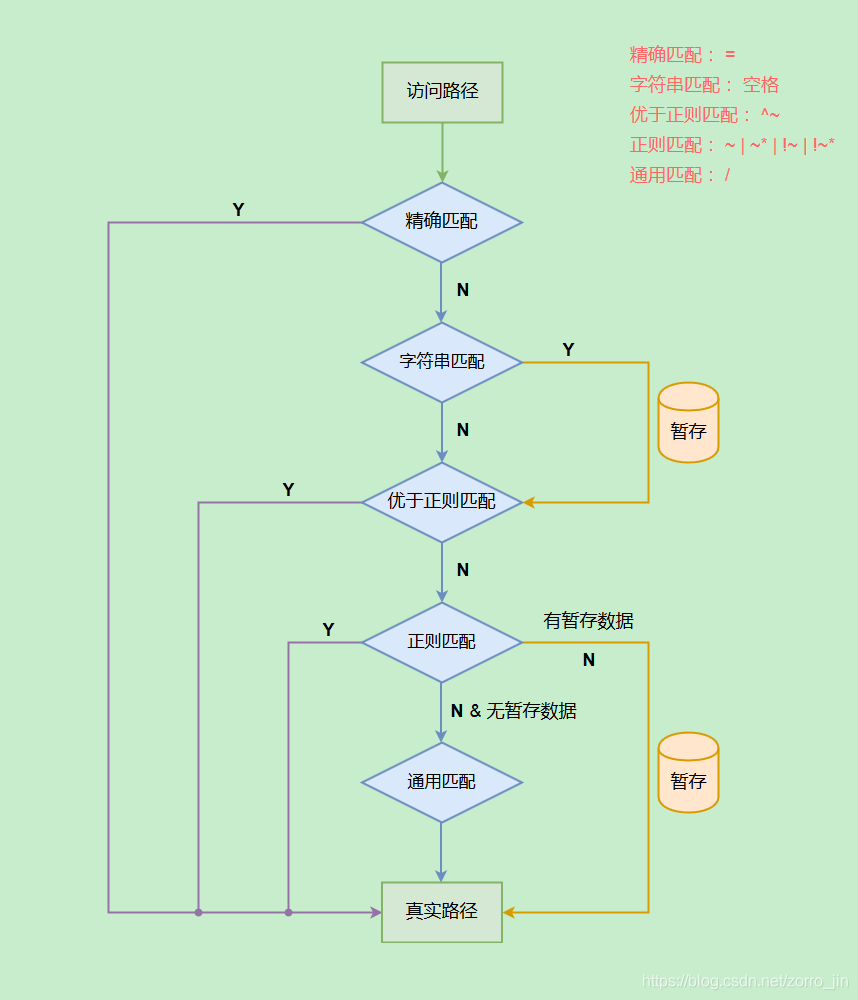一、location语法
location [ = | 空格 | ~ | ~* | ^~ ] uri {
...
}- 精准匹配: =
- 字符串匹配: 空格
- 优于正则匹配: ^~
- 正则匹配: ~ | ~* | !~ | !~*
- 通用匹配: /
其中," ~ "表示-正则匹配且区分大小写;" ~ *"表示-正则匹配且不区分大小写;加上" ! "代表-不匹配
二、多个location的匹配顺序

第一步:匹配带 " = " 的精准匹配,若匹配上,则直接返回;
第二步:匹配带 " 空格 " 的字符串匹配,若匹配上则先保存,不直接返回;
第三步:匹配带 " ^~ "的优于正则匹配,若匹配上了,则直接返回;
第四步:匹配带 " ~ | ~* | !~ | !~* "的正则匹配,若匹配上了,则直接返回;若没有匹配上,但是第二步匹配上了,则直接返回第二步匹配上的;
第五步:匹配仅 " / " 的通用匹配,这个是任意访问路径都能匹配上的,直接返回。
注:
1、在同一级匹配规则下,按照在配置文件中的先后顺序匹配判断,匹配中了就立即返回(字符串匹配不直接返回);
2、对于字符串匹配,总是暂存匹配字符串最长的那一个记录。
三、示例说明
修改了nginx.cof文件一定要先验证配置文件是否配置成功,再启动!!!
在另一篇博客中有写到Nginx一些常用命令,感兴趣可以看看,欢迎指错。附上博文地址:Nginx在windows下的安装、运行,以及配置文件讲解
# 精准匹配
location = /public/index.html {
default_type text/html ;
return 601 '============================== 精准匹配601【location = /public/index.html】 ==============================';
}
# 字符串匹配
location /public/index.html {
default_type text/html ;
return 611 '============================== 字符串匹配611【location /public/index.html】 ==============================';
}
location /public/login.html {
default_type text/html ;
return 612 '============================== 字符串匹配612【location /public/login.html】 ==============================';
}
location /public/ {
default_type text/html ;
return 613 '============================== 字符串匹配613【location /public/】 ==============================';
}
location /public/second.html {
default_type text/html ;
return 614 '============================== 字符串匹配614【location /public/second.html】 ==============================';
}
# 优于正则匹配
# 优于正则匹配中不能写与字符串匹配相同的访问路径,没有意义。
# location ^~ /public/index.html {
# default_type text/html ;
# return 621 '============================== 优于正则匹配621【location ^~ /public/index.html】 ==============================';
# }
location ^~ /public/regist.html {
default_type text/html ;
return 623 '============================== 优于正则匹配623【location ^~ /public/regist.html】 ==============================';
}
location ^~ /public/first.html {
default_type text/html ;
return 623 '============================== 优于正则匹配623_1【location ^~ /public/first.html】 ==============================';
}
# 正则匹配
location ~ \/public\/index\.html$ {
default_type text/html ;
return 631 '============================== 正则匹配631【location ~ \/public\/index\.html】 ==============================';
}
location ~ \/public\/first\.html$ {
default_type text/html ;
return 633 '============================== 正则匹配633_1【location ~ \/public\/first\.html】 ==============================';
}
location ~ \/public\/second\.html$ {
default_type text/html ;
return 634 '============================== 正则匹配634【location ~ \/public\/second\.html】 ==============================';
}
# 通用匹配
location / {
default_type text/html ;
return 640 '============================== 通用匹配640【location /】 ==============================';
}1、【精准匹配】请求地址:http://localhost:5021/public/index.html

2、【字符串匹配】请求地址:http://localhost:5021/public/login.html
注:实际上是经过"字符串匹配"将返回结果暂存,再经过"优于正则匹配"和"正则匹配"之后,未发现匹配成功的,最终返回暂存结果。

3、【优于正则匹配】请求地址: http://localhost:5021/public/regist.html
注:实际上是经过"字符串匹配 [location /public/] "将返回结果暂存,再经过"优于正则匹配",发现匹配成功的,最终返回"优于正则匹配"结果。

3-1、【优于正则匹配】请求地址: http://localhost:5021/public/first.html

4、【正则匹配】请求地址: http://localhost:5021/public/second.html
注:实际上是经过"字符串匹配 [location /public/second.html] "将返回结果暂存,再经过"优于正则匹配",未发现匹配成功的,再经过"正则匹配"发现匹配成功的,最终返回"正则匹配"结果。

5、【通用匹配】请求地址:http://localhost:5021/static/common.html
注:当经过所有的匹配规则之后,都没有匹配成功的,则进入"通用匹配",所有请求都能匹配成功。

